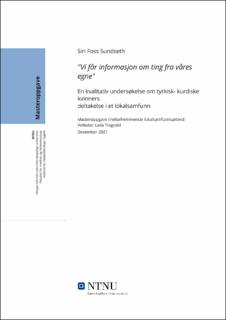| dc.description.abstract | Sammendrag
Innledning: En flerkulturell drabantbydel i en middels stor by i Sør-Norge har hatt sosioøkonomiske utfordringer over lengre tid knyttet til levekårsvariabler som inntekts- og utdanningsnivå, arbeidsledighet, læringsmiljø og læringsresultater ved skolene, for å nevne noen. Et kommunalt organisert områdeløft for bydelen ble igangsatt i 2013, og pågikk til og med 2020. Områdeløftet har gitt bydelen nye møteplasser og det har blitt lagt til rette for økt deltakelse i lokalsamfunnet. Flere initiativtakere har i perioden gjort forsøk på å inkludere de tyrkisk-kurdiske innbyggerne som utgjør en stor gruppe i bydelen, men opplevde rekrutteringen av denne gruppen som vanskelig. Oppstarten av treningsaktiviteten, «dametrim», var et av initiativene og er fokus for denne avhandlingen.
Metode: Oppgaven er basert på seks kvalitative dybdeintervjuer av initiativtakere og deltakere i treningsaktiviteten for kvinner med tyrkisk-kurdisk bakgrunn. Hensikten var å undersøke hvilke opplevelser og erfaringer initiativtakerne hadde med å initiere aktiviteten og hvordan deltakerne opplevde og erfarte å delta i et slikt initiativ. Videre ble det undersøkt nærmere hvordan deltakerne med tyrkisk-kurdisk bakgrunn ønsker å leve, delta og inkluderes i lokalsamfunnet. Det innsamlede datamaterialet ble analysert med en fenomenologisk analysemetode.
Resultater/Diskusjon: Resultatene viser at informantene som deltok i treningsaktiviteten er fornøyde med tilværelsen i bydelen, og virker ikke påvirket av de uttalte sosioøkonomiske problemene. De har et godt nettverk rundt seg, og sier det føles trygt å bo der. Kvinnene har en travel hverdag og balanserer tiden med jobb, oppgaver i hjemmet, familie og venner, samt fritidsaktiviteter med barna. De bruker de fleste møteplassene som idrettsarenaer, biblioteket, restauranter og plasser utendørs, men har en særlig tilknytning til den lokale moskéen og kulturforeningen. Deltakerne opplevde treningsaktiviteten som et bra initiativ, men ønsket mer struktur og planlegging. I forhold til bekjentgjøring påpekte både initiativtakerne og deltakerne at det er lite hensiktsmessig å henge opp lapper på butikken for å informere om tilbudet. Alle deltakerne ble rekruttert ved direkte forespørsel fra venninner, hvilket tyder på at rekrutteringskanaler kan være ulike innad i bydelen. Den konkrete målgruppen foreslo selv andre arenaer for rekruttering, som for eksempel den lokale moskéen og kulturforeningen i bydelen. Dette er arenaer som initiativtakerne ikke hadde tenkt på i rekrutteringsøyemed. Avslutning: Det er viktig at initiativtakere involverer målgruppa i arbeidet knyttet til områdeløft. For å få en bedre oppslutning om ulike initiativer, må et bedre samarbeid på plass.
Samtidig må initiativtakerne skaffe seg kunnskap om behovene blant innbyggerne.
Rekrutteringsarenaer som moskeen og kulturforeningen er her forslått av deltakerinformantene. Ved å skape et slikt samarbeid, kan målgruppen selv uttale sine ønsker og behov for initiativer som skal fremme helsen hos dem selv.
Nøkkelord: innvandrerkvinner, inkludering, deltakelse, lokalmiljøet, rekruttering | |
| dc.description.abstract | Summary
Introduction: A multicultural district in a medium sized city, south of Norway, has had socio-economic challenges over a longer period of time. Due to variables in living conditions such as personal income, level of education, unemployment and learning environment in local schools. A program organized by the municipality aiming to boost this certain district started in 2013, and continued until 2020. Some of the results were more meeting spots (arenas for social gathering) and an increasement of peoples participation in the local community was facilitated. Many of the initiators had also been working to include people of Turkish-Kurdish origin, which is a dominant group in the community. «Dametrim», a social gathering with physical exercise for women, was one of the initiatives.
Methode: The assignment is based upon six qualitative interviews with both initiators and participants of activities for women of Turkish-Kurdish origin. The purpose of it was to investigate how the initiators experienced the process of organizing “dametrim”, and how the participators experienced attending it. Further I aimed to investigate how the participants from the Turkish-Kurdish group wish to live, contribute and be included in the local community.
The collected data was analyzed with a phenomenological method.
Result/Discussion The result shows that the informants who participated in the training activities are generally satisfied with their lives in this district, and don’t seem affected by the socioeconomical problems. They have a large social network, and they also describe the district as a safe neighborhood. They have busy day-to-day lives. Their time is shared between professional work, housework, family and friends, as well as following up their children´s leisure activities. They use most of the meeting spots, such as sports arenas, library, restaurants and places outside. In addition, the participants have a strong affiliation to the local mosque and the cultural association. The participants experienced the training activities as a positive initiative, but that it should have been more thoroughly planned with more of a structure. In terms of recruitment, both the initiators and participants regarded it unnecessary to hang up notes at the local store for information. All of the participants were recruited by a direct requests from friends, which indicates that channels of recruitment may be different within the district. For this certain target group, the participants suggested recruitment through the mosque and the cultural association - arenas for recruitment the initiators haven’t thought of.
End In such a program, with a goal of boosting a district and a local community, it is important that the initiators involve the target group. To have better support behind different initiatives, a better cooperation is needed. Simultaneously, the initiators have to gain knowledge of what the inhabitants` needs are. The mosque and the cultural association as arenas for recruitment were in this case suggested by the participants´ informants, and also suggested by them as the best places for a cooperation. In this way, the target group itself may express their own needs and requirements in regard to initiatives with a goal to better their own health.
Key words: immigrant women, inclusion, participation, local community, recruitment | |
